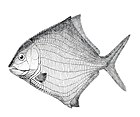Eurynotoides
| Eurynotoides Temporal range: Permian
| |
|---|---|
| Scientific classification | |
| Domain: | Eukaryota |
| Kingdom: | Animalia |
| Phylum: | Chordata |
| Class: | Actinopterygii |
| Order: | †Eurynotoidiformes |
| Family: | †Eurynotoididae |
| Genus: | †Eurynotoides Berg, 1940 |
| Species | |
| |
| Synonyms | |
| |
Eurynotoides is an extinct genus of prehistoric bony fish[1] in the family Eurynotoididae of the order Eurynotoidiformes.[2]
Taxonomy
[edit]The genus was erected by Berg in 1940. In 1974, Sergienko described a new genus and species Heterolepis multa from the Middle Permian (Kazanian) of Kemerovo Region, Russia, as a new member of the Palaeoniscidae family. However, Heterolepis was already in use for the extant snake Heterolepis capensis (Smith, 1847), making Sergienko's naming a junior homonym. In 2023, A. S. Bakaev redescribed "Heterolepis" multa as a new species in the genus Eurynotoides, E. multa. This species is different from E. nanus and E. costatus by having ganoin peninsula-shaped structures on the anterior margin of the scale as well as by the presence of denticles on both posterior and lower edge of the scale.[2]
See also
[edit]References
[edit]- ^ Sepkoski, Jack (2002). "A compendium of fossil marine animal genera". Bulletins of American Paleontology. 364: 560. Archived from the original on July 23, 2011. Retrieved 2009-02-27.
- ^ a b A. S. Bakaev (2023). "Revision of Permian Ray-Finned Fishes from the Kazankovo-Markino Formation of the Kuznetsk Basin". Paleontological Journal. 57 (3): 335-342. doi:10.1134/S0031030123030036. Archived from the original on July 8, 2023.
External links
[edit]- "Eurynotoides". Paleobiology Database. Retrieved 2024-02-22.








